#but I will say he has a better head for horror and (performative) decorum than Francis and company ever will
Note
The bad dracula adaptations are easier to swallow if you think of them as having Dracula behind the scenes on every film doing revisionist history as a his petty, century spanning revenge on the DracAttackPack
Thematically, I could almost see it. But then that would mean he was also the one actively defanging all of his cinematic stand-ins and turning them into the directors' vampire-banging fanfic insert. Including the smarmy headache that was posing and GQing around in The Invitation.
Even if it was in the name of long game prickishness, I think Dracula would rather take a holy water jacuzzi than have a hand in presenting himself as Vampire Ken Doll to the masses
#there aren't many good points to the Count#but I will say he has a better head for horror and (performative) decorum than Francis and company ever will#dracula#dracula daily
11 notes
·
View notes
Text
THE SILENCE OF THE LAMBS
When my concerned parents faced the early and unpleasant realization that they were raising a ravenous little horror hound, it meant that they had to somehow split the difference between their strict curbing of my potentially mid-warping viewing habits, and their principled encouragement of unfettered reading. That must be how I came into possession of a copy of Thomas Harris' harrowing police procedural The Silence of the Lambs at the tender age of 10, even as the film adaptation was being touted by many viewers as The Scariest Movie of All Time. I carried that book around like the Bible well into my teenage years, reading and re-reading it with even greater fervor after my parents finally decided that the film was sophisticated enough for me to watch without it turning me into some kind of animal-torturing arsonist. (Said screening was chaperoned and accompanied by an academic post-viewing family discussion, of course) The decision seemed to make sense; after all, THE SILENCE OF THE LAMBS had swept the Oscars the year it was released, scooping up wins for Best Director, Best Actor, Best Actress, Best Adapted Screenplay, and Best Picture. This is not to say that my intellectual and art-appreciating family regarded the Academy as the ultimate arbiters of taste and achievement. I mention these accolades more to point out that, as my parents had surely noticed, the film holds a certain power over viewers on both sides of the high-low cultural divide, a spell that has hardly weakened in its twenty-seven years of life.
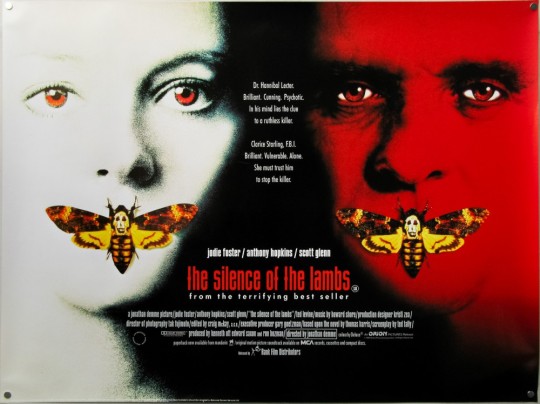
As a child, I certainly responded to the same things that piqued the general public: Anthony Hopkins' iconic performance as Hannibal "The Cannibal" Lecter, his ambiguous romance with purehearted FBI trainee Clarice Starling, and the controversial perversity of serial killer Buffalo Bill. Though the story shares the influence of real-life ghoul Ed Gein with classic shockers like PSYCHO and THE TEXAS CHAIN SAW MASSACRE, the impact of SILENCE is more akin to that of DRACULA. Much of the enduring discussion about the film revolves around the tantalizing chemistry between the preternaturally elegant Dr. Lecter and the virginal Starling; the rest is somewhat unfortunately focused on Ted Levine's eccentric performance as the (pseudo-) transsexual murderer at large, which has come under some understandable scrutiny. However, it would be unjust to reduce Jonathan Demme's movie to a gothic romance, or a gory shocker, or a campy cult item with ironic eroticism and a great soundtrack. There simply have to be better reasons for a movie to stick around this long, lingering in the minds of stuffy critics and the hoi polloi alike.
In preparing my statements about what makes THE SILENCE OF THE LAMBS stand out, I learned something very shocking: It began its life as the directorial project of Gene Hackman. Hackman eventually dropped out when the script produced by (Oscar-winner) Ted Tally turned out to be too violent. Prospective Starlings like Michelle Pfeiffer and Meg Ryan were similarly disgusted, so Demme got stuck with a less likely candidate in (Oscar-winner) Jodie Foster. Personally, I find (Oscar-winner) Demme himself to be an unlikely candidate. The director cut his teeth on exploitation movies under Roger Corman, and by the time of SILENCE, had distinguished himself as a hipster extraordinaire, directing classic performance videos for the Talking Heads and Spaulding Gray, as well as chic comedies speckled with cameos from the likes of John Waters, and underground music firebrands from New York's new wave scene. Time would prove that Demme and his frequent collaborator, cinematographer Tak Fujimoto, were perfect choices for this grim project, which only supports the idea that there is something more happening with SILENCE OF THE LAMBS than its gruesome violence and epic sexual tension.
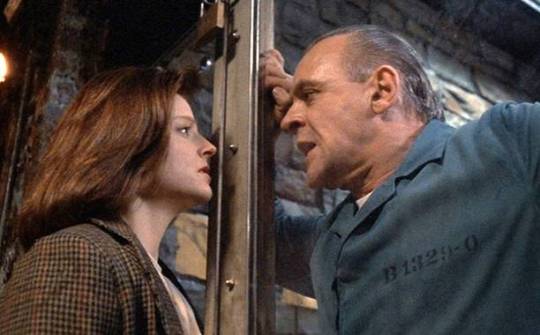
In light of these more famous elements, one might expect an adaptation of Thomas Harris' grim and seductive novel to be grandiose, expressionistic, swathed in a dense physical and emotional mist, rumbling with its own pomp and circumstance. An orphan from the hills of West Virginia, Clarice Starling is a tragic hero from the start, guarding her broken heart against a world of condescending and hostile men. Her mentor Jack Crawford seems to distinguish himself from the herd by assigning her the ambitious task of interviewing notorious serial killer Hannibal Lecter for the FBI's files--but in fact, Crawford is counting on Starling's feminine charms and naivety, secretly using her to manipulate Lecter into profiling a killer at large, Buffalo Bill. In spite of this nasty revelation, Starling sticks with it, suffering Lecter's high-minded insults and penetrative analysis of her character, and eventually earning his admiration. She proves herself not only brave and determined, but a detective of unparalleled wit and instinct, single-handedly taking down the polymorphously perverse Buffalo Bill in his moth-filled subterranean lair, rescuing a high-profile victim where the entire rest of the Federal Bureau of Investigation have failed.
This all seems to portend a bigger, louder movie than what has been committed to film. However, the book has a certain organic grit to it, something honest, downbeat and tragically real, which Demme and Fujimoto grasp instinctively. The film provides a dry, frank view of the life of Clarice Starling: the toil of academia, the drudgery of physical conditioning, the undermining attitudes of her mostly-male peers. Shot in West Virginia and Pennsylvania, Starling's world is bleak and desolate, but earnestly so, without the pageantry of the film noir and Universal horror movies with which it is so easily compared. Demme's education under B-movie king Corman shows here, and makes for a much more compelling iteration of the story than we might have from someone less accustomed to economy. While SILENCE has developed a reputation for its brutality, the film is not remotely so gore-drenched as many traumatized viewers would have you believe. That said, it may be the film's generally stark and desicated look, its workaday-ness, and its endless (wonderful) dialogic exchanges that throw into relief its comparatively minimal violence, which usually appears not in scenes of assault, but in crime scene photos or autopsy scenes.
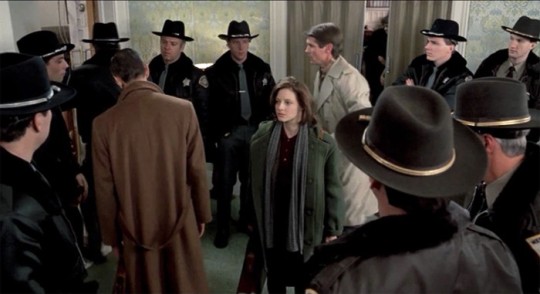
The blanched, dreary look of the film also offsets the emotional plight of Clarice Starling. She is afforded no real romance, external or internal. The petite and clear-eyed orphan is visibly used to, and exhausted by, the constant need to look out for herself, and SILENCE will see her shuffled from one humiliating personal trial to the next. She is led into a perilous situation by a mentor who pretends to respect her abilities, but who really counts on her to fall short of discovering his scam; She is trapped in roomfuls of macho cops who scarcely acknowledge her; She has to negotiate the sexual attention of evidence technicians and bureaucrats; She even has semen flung at her by a particularly rambunctious neighbor of Lecter's. (And how often do you see that in any movie? As gross as it is, it has a way of reinforcing the extreme adult-ness of Demme's often dry, methodical movie) And then of course, there is Lecter himself, who turns Starling's personal vulnerability into a form of currency with which she can buy the scant clues that lead her to her quarry. Instead of eroticizing the anomalous femininity that Starling brings to the traditionally masculine world of law enforcement, Demme constantly reminds you of her fear, her embarrassment, her alienation. One can also imagine the temptation to Ripley-fy the character, presenting her as a fully-formed badass not to be fucked with. Instead, by eschewing both these femme and fatale modes, Demme describes Clarice Starling as three-dimensional human being whose heroism is extremely hard-won. While the character is undeniably one of the great Strong Female Protagonists, Jodie Foster's performance somehow defies the cinematic semiotics of gender altogether, giving us a person whose most important qualities are purely psychological. Tak Fujimoto drives the point home by frequently filling the screen with closeups of her face, focusing us on what she thinks and says, taking the proverbial heat off her body. Even as Lecter probes her for painful biographical information, Starling's sexuality remains entirely private--still a rare thing in any movie with a lady lead.
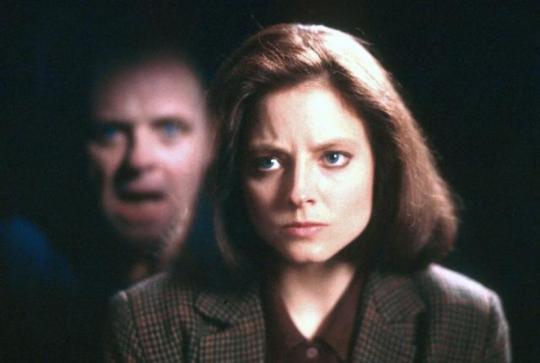
I don't mean to suggest that THE SILENCE OF THE LAMBS is principally successful because of its plucky girl detective--that contributes to its greatness, but not in the feminist fashion that I seem to be angling for. I am reviewing this movie presently because I recently found myself looking back on my own history with it, comparing my feelings with those of popular audiences, and thinking, "What is The Silence of the Lambs really about?" It can't be so beloved *only* due to the sexy slow burn between Anthony Hopkins' Count Dracula and Jodie Foster's Mina Harker. It can't be *just* a matter of the exotic insanity of the gender-bending madman sewing together the flesh of his victims and dancing provocatively to "Goodbye Horses" by Q Lazzarus (a sadly mysterious musician who Demme certainly knew from his involvement in the New York underground). All of these characters, and their respective dynamics, contribute to the important thrill of this movie, but not in the way that most people seem to think.
Rather like the director's earlier work with iconoclastic punk icons and indie auteurs, THE SILENCE OF THE LAMBS is about authenticity. Hannibal Lecter, the unparalleled genius whose culinary expertise is part of his murderous MO, is a serial killer because he has such refined taste and decorum that he cannot live peaceably among other people. He favors victims whom he perceives as tacky, pretentious and impertinent--Starling knows that he would never harm her because, as she famously remarks, "He would consider it rude." Lecter is fascinated, not by her youthful beauty as Crawford had hoped, but by her sincerity. Starling is brilliantly intelligent in her own right, as she proves through her police work, but she doesn't have an ironic bone in her body. She is the most unpretentious individual alive, and nothing could be more interesting to Lecter, who preys upon people who are untrue to others and to themselves. Meanwhile, we have Buffalo Bill, who is attempting to change his sex by crafting a full-body "woman suit"--but, as Lecter insists, the killer is not a "true transsexual" whose legitimate identity is that of the opposite sex. Buffalo Bill is someone who was reared by his abusive parents to hate himself so much, that he is compelled to escape his natural identity; becoming a woman is less important as a matter of self-actualization, than as a means of becoming an entirely different person, *any* different person. He has been so radically alienated from his own essence by this self-loathing, that he is incapable of authenticity of any kind.
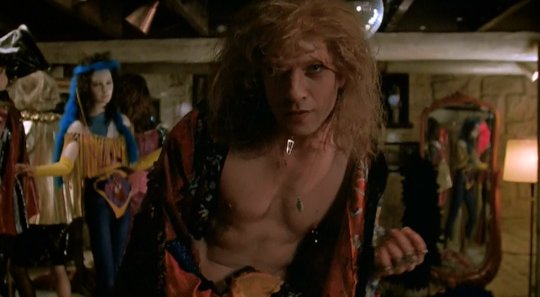
That, I really think, is the secret power of THE SILENCE OF THE LAMBS: the at-once satanic and profoundly innocent declaration, "to thine own self be true". I would really love to get into a deeper dive on this movie at some point, to discuss what I think must have been the very best and very last time that Anthony Hopkins gave us a fearless and unpredictable (and in this case, somewhat hilarious) performance; to insist that Ted Levine as Buffalo Bill and Brooke Smith as his would-be victim actually give the best performances in the whole movie; to talk about the problem of the Ubiquitous Daddy Figure (of whom there are no fewer than THREE in this movie) in so many narratives about powerful women; to simply analyze the movie's sly psychological techniques, like fully humanizing Brooke Smith *just* by showing her singing a few bars of a beloved pop song in closeup, immediately before her fate takes a disastrous turn. (I would probably not take such an opportunity to investigate accusations of homophobia and transphobia, which requires a smarter and more directly experienced voice than my own) There is really a lot to say about why SILENCE is so powerful, without even threatening to address its most famous features. Unfortunately, I don't have the gumption or the madness to commit all that to Letterboxd at the moment, so I'll have to be satisfied with my primary conclusion: That the film's simplicity and gritty naturalism mirror its commitment to spiritual purity, honesty, and self-knowledge at all costs. Even at the high cost of wearing a muzzle, any time they let you out of your cage.
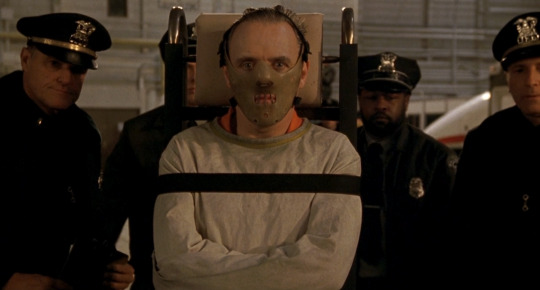
#blogtober#the silence of the lambs#thomas harris#jonathan demme#tak fujimoto#jodie foster#ted levine#brooke smith#scott glenn#clarice starling#hannibal lecter#buffalo bill#horror#adaptation#ted tally#suspense#procedural#thriller
26 notes
·
View notes